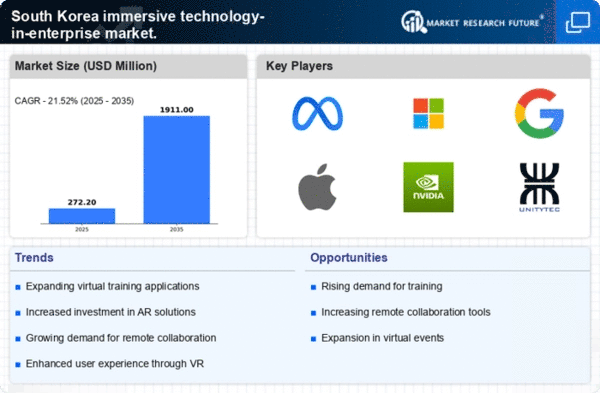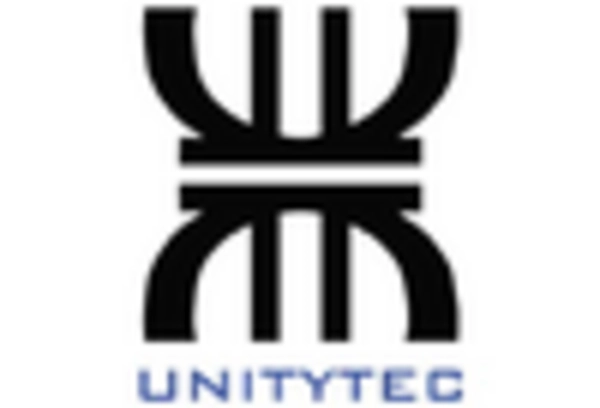Integration of AI and Machine Learning
The integration of artificial intelligence (AI) and machine learning into immersive technology solutions is transforming the landscape of the immersive technology-in-enterprise market. In South Korea, businesses are leveraging AI to create more personalized and adaptive immersive experiences. For instance, AI algorithms can analyze user behavior and preferences, allowing for tailored training programs and simulations. This trend is expected to enhance user engagement and retention, making immersive solutions more effective. By 2025, the market for AI-enhanced immersive technologies is anticipated to grow by 30%, indicating a strong alignment between AI advancements and the immersive technology-in-enterprise market. This synergy is likely to attract further investment and innovation in the sector.
Technological Advancements in Hardware
The immersive technology-in-enterprise market is experiencing rapid growth due to advancements in hardware capabilities. In South Korea, companies are increasingly investing in high-performance devices such as VR headsets and AR glasses, which enhance user experience and productivity. The introduction of lightweight, ergonomic designs and improved display technologies has made these devices more accessible and appealing to enterprises. As of 2025, the market for VR and AR hardware in South Korea is projected to reach approximately $1.5 billion, reflecting a compound annual growth rate (CAGR) of around 25% over the next five years. This surge in hardware innovation is likely to drive adoption across various sectors, including manufacturing, healthcare, and education, thereby expanding the immersive technology-in-enterprise market significantly.
Increased Focus on Training and Development
The immersive technology-in-enterprise market is witnessing a heightened focus on training and development initiatives. South Korean companies are increasingly adopting VR and AR solutions to provide immersive training experiences that enhance learning outcomes. These technologies allow for realistic simulations, enabling employees to practice skills in a safe environment. Reports indicate that organizations utilizing immersive training solutions have seen a 50% improvement in knowledge retention compared to traditional methods. As businesses recognize the value of effective training programs, the demand for immersive technology solutions is expected to rise, further propelling the growth of the immersive technology-in-enterprise market in South Korea.
Rising Consumer Expectations for Innovation
Consumer expectations for innovation are driving enterprises in South Korea to adopt immersive technologies. As customers become more accustomed to engaging with brands through immersive experiences, businesses are compelled to integrate these technologies into their operations. The immersive technology-in-enterprise market is responding to this demand by offering solutions that enhance customer engagement and satisfaction. Companies that leverage VR and AR for marketing, product demonstrations, and customer service are likely to gain a competitive edge. In 2025, it is estimated that 60% of South Korean enterprises will implement some form of immersive technology to meet consumer expectations, indicating a robust growth trajectory for the immersive technology-in-enterprise market.
Growing Demand for Remote Collaboration Tools
The shift towards remote work and collaboration has created a burgeoning demand for immersive technology-in-enterprise market solutions. South Korean enterprises are increasingly seeking tools that facilitate virtual meetings, training sessions, and collaborative projects in immersive environments. This trend is underscored by a reported 40% increase in the use of VR and AR platforms for remote collaboration in 2025. Companies are recognizing the potential of these technologies to enhance communication and teamwork, leading to improved productivity and reduced operational costs. As organizations continue to adapt to hybrid work models, the immersive technology-in-enterprise market is poised for substantial growth, driven by the need for effective remote collaboration solutions.

















